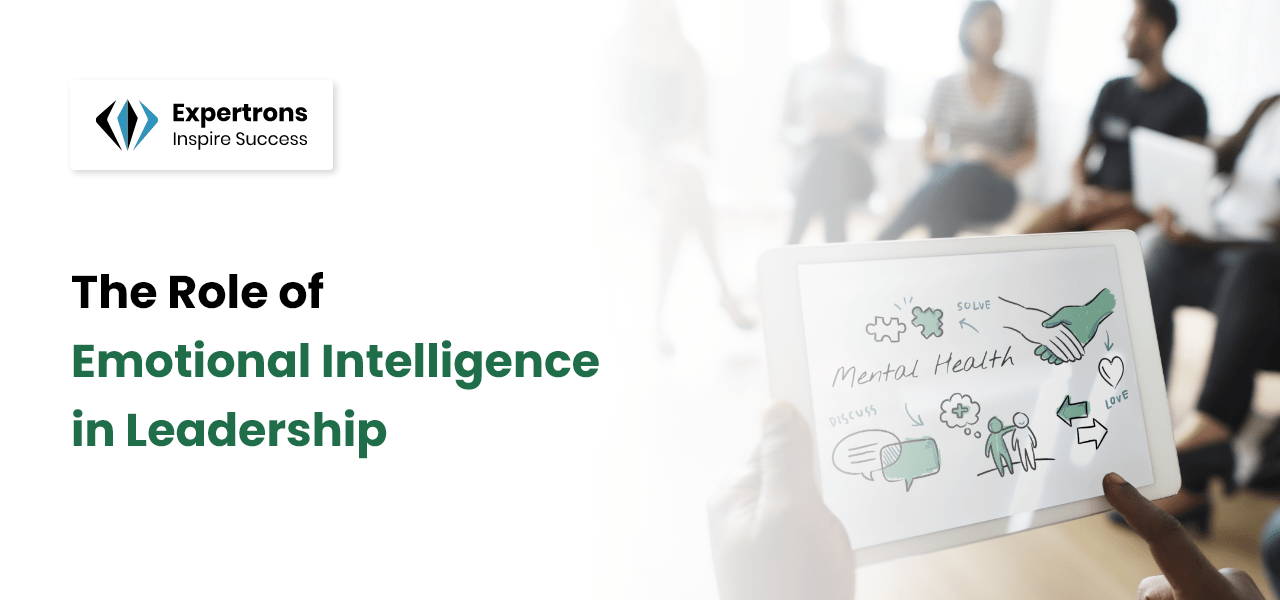Introduction
In today’s fast-paced world, effective leadership is more crucial than ever. Leaders are expected not only to drive results but also to inspire and deeply connect with their teams. This is where emotional intelligence (EI), often referred to as EQ, in leadership, plays a pivotal role. Emotional intelligence in leadership encompasses the ability to understand, manage, and harness one’s own emotions, while also recognizing and influencing the emotions of others. In the realm of leadership, emotional intelligence in leadership is a definitive game-changer.
Understanding Emotional Intelligence
What is Emotional Intelligence?
Emotional intelligence is the capacity to be aware of, control, and express one’s emotions, and to handle interpersonal relationships judiciously and empathetically. It consists of five key components:
- Self-Awareness: Recognizing one’s emotions and their impact.
- Self-Regulation: Managing one’s emotions healthily.
- Motivation: Being driven to achieve for the sake of achievement.
- Empathy: Understanding others’ emotions.
- Social Skills: Managing relationships to move people in desired directions.
The Importance of Emotional Intelligence in Leadership
Building Strong Relationships
Leaders with high EI can forge stronger relationships by understanding and respecting the emotional states of their team members. This creates a foundation of trust and open communication.
Enhancing Team Performance
A leader’s ability to manage their own emotions and understand those of their team can lead to higher morale, better collaboration, and increased productivity. Teams led by emotionally intelligent leaders often report higher job satisfaction and commitment.
Promoting a Positive Work Environment
Emotionally intelligent leaders create a positive and inclusive work culture. They are adept at recognizing and addressing the emotional needs of their team, leading to a more harmonious workplace.
Navigating Complex Situations
High EI allows leaders to navigate the complexities of the workplace with grace and effectiveness. They can manage conflicts, make informed decisions, and lead their teams through change with resilience.
Self-Awareness in Leadership
Understanding Personal Strengths and Weaknesses
Self-aware leaders have a clear understanding of their strengths and areas for improvement. This self-knowledge allows them to leverage their strengths and work on their weaknesses effectively.
Reflecting on Personal Behavior and Its Impact
Leaders who regularly reflect on their behavior and its impact on others can make more informed decisions. This reflection helps in building stronger relationships and improving team dynamics.
Techniques for Improving Self-Awareness
- Journaling: Writing down thoughts and experiences to gain insights.
- Feedback: Seeking constructive feedback from peers and mentors.
- Mindfulness: Practicing mindfulness to stay present and aware of one’s emotions.
Self-Regulation and Effective Leadership
Managing Emotions in Stressful Situations
Self-regulated leaders can manage their emotions, even in stressful situations. This ability to stay calm and composed helps in making rational decisions and maintaining team morale.
The Role of Self-Discipline
Self-discipline is crucial for leaders to stay focused and consistent in their actions. It helps in setting and achieving goals while maintaining a positive work environment.
Strategies for Self-Regulation
- Breathing Techniques: Using deep breathing to calm the mind.
- Pause and Reflect: Taking a moment before reacting to situations.
- Healthy Lifestyle: Maintaining a balanced diet, exercise, and sleep routine.
Motivation and Leadership
The Connection Between Self-Motivation and Leadership Success
Self-motivated leaders are passionate and driven, which inspires their team. Their enthusiasm and commitment to goals are contagious, leading to higher team motivation and performance.
Inspiring and Motivating Others
Emotionally intelligent leaders can inspire and motivate their team by understanding their needs and aspirations. They create an environment where team members feel valued and driven to achieve.
Techniques to Maintain High Motivation Levels
- Goal Setting: Setting clear and achievable goals.
- Positive Reinforcement: Recognizing and rewarding accomplishments.
- Personal Growth: Encouraging continuous learning and development.
Empathy: The Heart of Emotional Intelligence
Understanding and Connecting with Team Members
Empathetic leaders can understand and connect with their team members on an emotional level. This connection fosters trust and loyalty, creating a supportive work environment.
The Impact of Empathy on Team Dynamics
Empathy enhances team dynamics by promoting understanding and collaboration. Leaders who show empathy can resolve conflicts more effectively and create a cohesive team.
Ways to Develop Empathy as a Leader
- Active Listening: Paying full attention to team members and their concerns.
- Perspective-Taking: Trying to see situations from others’ viewpoints.
- Compassion: Showing genuine care and concern for team members.
Social Skills and Leadership
Effective Communication
Leaders with strong social skills excel in communication. They can convey their vision clearly, listen actively, and provide constructive feedback.
Conflict Resolution
Effective leaders can navigate conflicts by understanding the emotions involved and finding mutually beneficial solutions. They maintain harmony within the team.
Building and Maintaining Professional Relationships
Socially skilled leaders build strong professional networks. These relationships are crucial for collaboration, support, and career advancement.
Case Studies of Leaders with High Emotional Intelligence
Example 1: A Renowned Business Leader
Consider a business leader like Satya Nadella, CEO of Microsoft. His high EI has been pivotal in transforming Microsoft’s culture and driving innovation.
Example 2: A Successful Political Figure
Barack Obama’s leadership exemplifies high emotional intelligence. His ability to connect with people and navigate complex political landscapes highlights the power of EI in leadership.
Lessons Learned from These Leaders
Both leaders demonstrate that emotional intelligence can lead to transformative leadership, fostering innovation, collaboration, and positive change.
How to Develop Emotional Intelligence
Training Programs and Workshops
Participating in EI training programs and workshops can help leaders develop their emotional intelligence. These programs often include practical exercises and feedback sessions.
Personal Development Activities
Engaging in activities such as journaling, meditation, and mindfulness can enhance self-awareness and emotional regulation.
Practicing Mindfulness and Reflection
Regular mindfulness practice helps leaders stay present and aware of their emotions. Reflection allows for continuous improvement in emotional intelligence.
Measuring Emotional Intelligence
Tools and Assessments Available
There are various tools and assessments, such as the Emotional Quotient Inventory (EQ-i) and the Mayer-Salovey-Caruso Emotional Intelligence Test (MSCEIT), that can measure EI.
The Benefits of Measuring EI
Measuring EI provides insights into one’s strengths and areas for improvement. It helps in creating targeted development plans for leaders.
Applying the Results to Improve Leadership
Using the results from EI assessments, leaders can focus on developing specific emotional intelligence skills, enhancing their overall effectiveness.
Challenges in Developing Emotional Intelligence
Common Obstacles Faced
Developing EI can be challenging due to ingrained habits and resistance to change. Leaders might struggle with self-awareness or empathy initially.
Overcoming Resistance to Change
Persistence and openness to feedback are key to overcoming resistance. Leaders must be willing to adapt and grow continuously.
Continuous Learning and Improvement
Emotional intelligence development is an ongoing process. Leaders should commit to lifelong learning and regular practice to maintain and enhance their EI skills.
The Future of Leadership with Emotional Intelligence
Emerging Trends
The future of leadership is increasingly recognizing the importance of EI. Trends such as remote work and digital transformation require leaders to be emotionally intelligent to manage virtual teams effectively.
The Evolving Workplace and EI
As workplaces evolve, the need for emotionally intelligent leaders grows. EI helps in navigating the complexities of a diverse and dynamic work environment.
Predictions for the Future
Emotional intelligence will become a core competency for leaders in the future. Organizations will prioritize EI in their leadership development programs, leading to more empathetic and effective leaders.
Also read, The Expanding World of Blockchain Applications Beyond Bitcoin
Conclusion
Emotional intelligence plays a vital role in effective leadership. Leaders with high EI can build strong relationships, enhance team performance, and create a positive work environment. By developing self-awareness, self-regulation, motivation, empathy, and social skills, leaders can navigate complex situations and inspire their teams. As the workplace continues to evolve, the importance of emotional intelligence in leadership will only grow, making it a crucial skill for future leaders.
Frequently Asked Questions
Leaders with high EI exhibit self-awareness, self-regulation, motivation, empathy, and strong social skills. They can understand and manage their emotions and those of others effectively.
EI can be taught through training programs, workshops, personal development activities, and regular practice of mindfulness and reflection.
Yes, emotional intelligence is a strong predictor of leadership success. Leaders with high EI are better at managing relationships, motivating teams, and navigating complex situations.
Emotional intelligence (EI) refers to the ability to manage and understand emotions, while IQ (Intelligence Quotient) measures cognitive abilities such as logical reasoning, problem-solving, and analytical skills. Both are important but serve different functions in leadership.
High EI allows leaders to consider the emotional aspects of decision-making, leading to more balanced and empathetic choices. It helps in understanding the emotional impact of decisions on team members and stakeholders.











